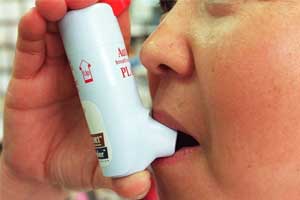- Home
- Editorial
- News
- Practice Guidelines
- Anesthesiology Guidelines
- Cancer Guidelines
- Cardiac Sciences Guidelines
- Critical Care Guidelines
- Dentistry Guidelines
- Dermatology Guidelines
- Diabetes and Endo Guidelines
- Diagnostics Guidelines
- ENT Guidelines
- Featured Practice Guidelines
- Gastroenterology Guidelines
- Geriatrics Guidelines
- Medicine Guidelines
- Nephrology Guidelines
- Neurosciences Guidelines
- Obs and Gynae Guidelines
- Ophthalmology Guidelines
- Orthopaedics Guidelines
- Paediatrics Guidelines
- Psychiatry Guidelines
- Pulmonology Guidelines
- Radiology Guidelines
- Surgery Guidelines
- Urology Guidelines
Children with asthma misuse inhaler, impacting their asthma control

USA: Respiratory inhaler devices provide quick relief from asthma and are a key to reduction in asthma-related morbidity. However, a recent study published in the Annals of Allergy, Asthma, and Immunology has found that only a few children are able to make correct use of the inhalers, while a majority of them thinks they are using it correctly when they are actually misusing it. This negatively impacts asthma control, quality of life, and morbidity stressing on the need for inhaler education in asthma patients.
The study showed that African American school children and their parents had confidence in their asthma inhaler technique when it was being misused.
Previous studies have shown that both children and parents overestimate the children's ability to properly use their inhaler. Anna Volerman, University of Chicago Medicine, Department of Medicine, Chicago, IL, and colleagues conducted the study to examine whether parent and child confidence were the same and whether either was a good sign of the child's actual ability to use the inhaler correctly.
The researchers surveyed 65 pairs of parents and children at four Chicago public charter schools. The age range of the children was 8 to 14 years, most were male and 90 percent were African American. Most parents (80 percent) were female.
Also Read: Thunder fever – A lethal situation for asthma patients
Key findings:
- Nearly all children (97 percent) misused their inhaler.
- One child demonstrated mastery.
- A small proportion of children and parents accurately matched their confidence in their child's technique.
- Five percent of children who were confident in their inhaler technique used their inhaler without misuse, while 4 percent of children whose parents were confident properly used their inhaler.
- None of the parents underestimated the children's skills.
Also Read: Children born via C-Sections at increased risk of Asthma, Allergies
"It's not enough for an allergist or other health care provider to ask a child or their parents if the child knows how to use an inhaler," says allergist Todd Mahr, ACAAI president. "Simply asking is not a reliable screening tool to determine who needs additional education on how to properly use an inhaler. If your child has asthma, check with your allergist to make sure your child has proper inhaler technique. Bring the inhaler with you to your next appointment and have your allergist or one of their staff watch your child use it."
The study results showed parents may be less accurate in predicting their child's inhaler ability than their child. The authors thought potential reasons may be children's daily experience with inhalers, parents' lack of knowledge about proper inhaler technique or parents' limited supervision of care.
For detailed study log on to https://doi.org/10.1016/j.anai.2019.04.012

Disclaimer: This site is primarily intended for healthcare professionals. Any content/information on this website does not replace the advice of medical and/or health professionals and should not be construed as medical/diagnostic advice/endorsement or prescription. Use of this site is subject to our terms of use, privacy policy, advertisement policy. © 2020 Minerva Medical Treatment Pvt Ltd